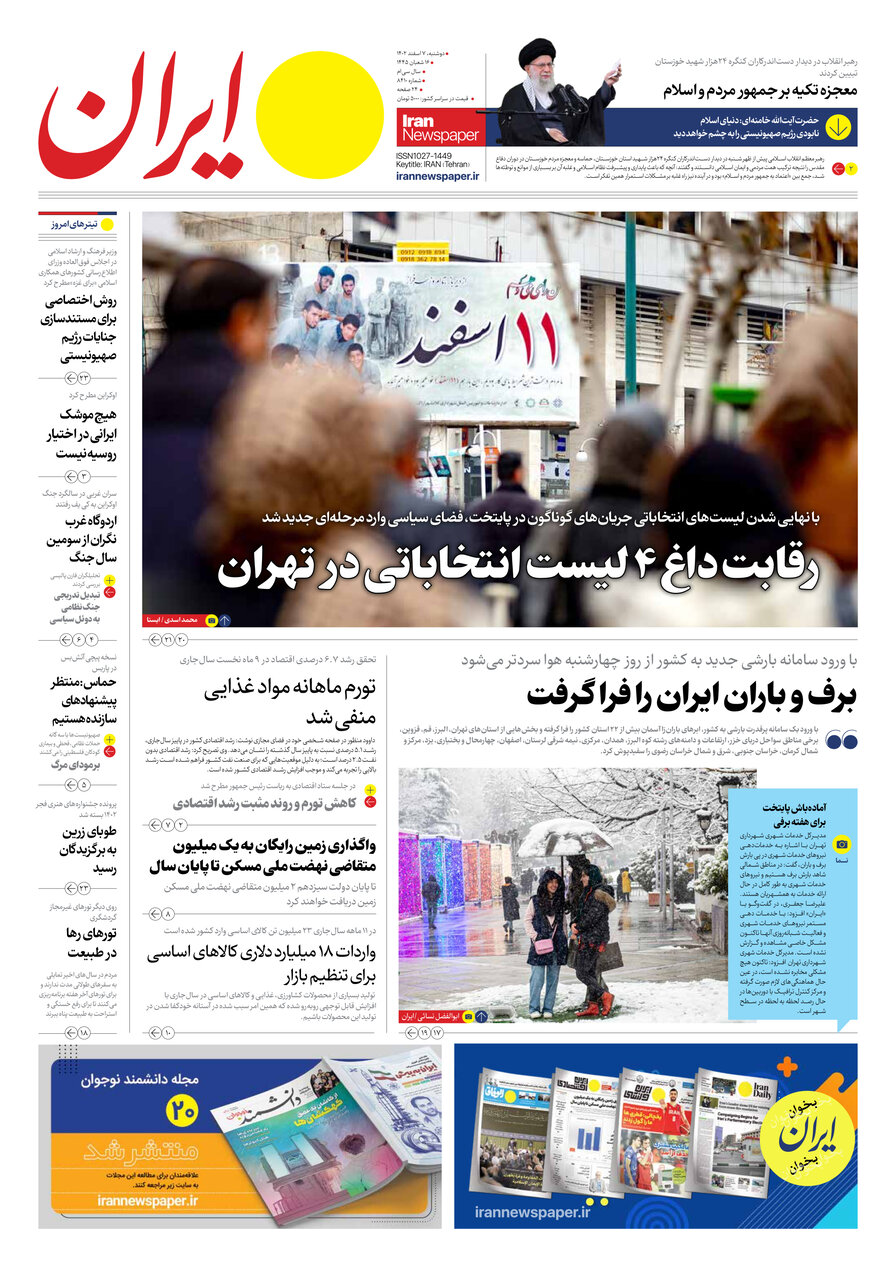Russia does not have any Iranian missiles

TEHRAN - In a note, the Iran newspaper analyzed a fake news report by Reuters that Iran had sent ballistic missiles to Russia.
It wrote: Citing anonymous news sources, the new scenario of the Reuters news agency, which claimed a few days ago that Iran had sent a large number of powerful ballistic missiles to Russia, was rejected by the Islamic Republic. It was a claim that even John Kirby, the spokesman of the White House Security Council, said America has not yet seen evidence confirming the transfer of these missiles from Iran to Russia. Earlier, Reuters was at the forefront of fake news that is sending military drones to Russia to help this country in the Ukraine war. These claims are not separate from the security and psychological propaganda of the West against Iran and Russia as two regional allies. Also, the war of attrition between Hamas and Israel and the more complicated situation of this (Israeli) regime has affected the military support of the United States for Ukraine. Therefore, it was not unexpected for Western circles to turn to such scenarios to cover up this complicated situation.
Shargh: West seeks to create tension
In an interview with Ali Akbar Farazi, a senior expert on NATO issues, Shargh addressed the West's new false claims against Tehran that the Islamic Republic has sent ballistic missiles to Russia with the aim of using them in the Ukraine war. It wrote: The West's accusations can be investigated from two perspectives. On the one hand, Westerners have tried to divert Russia's attention away the war in Ukraine and direct it to Iran. At the same time, Westerners are trying to divert Iran's attention from the war between Hamas and Israel and the Middle East in general to the war in Ukraine and other issues. In a sense they are try to put Iran in a dilemma.
Therefore, it has been tried to raise alarm about the perceived threat of Iran and Russia in the future. The purpose of these accusations is primarily intended to stop Russia’s war on Ukraine. In the current situation, these accusations can create a political, diplomatic, and media atmosphere against Moscow and Tehran, especially as Russia has the upper hand in the war with Ukraine and will probably win the war.
Hamshahri: An agreement that surprised America and Israel
In an analysis, Hamshahri discussed the relations between Tehran and Riyadh amid the Israeli war in the Gaza Strip and said: Experts believe that although the war in Gaza has created new challenges and opportunities for Iran and Saudi Arabia, the evaluations show that the two countries are not willing to increase tensions and participate directly in the war. In total, the evaluations show that the move between Iran and Saudi Arabia to resume diplomatic relations can be useful for both countries and gradually move towards reducing tensions and increasing security in West Asia. With China's help, these two countries agreed to normalize relations, which was a surprising issue for the United States and Europe. The resumption of ties showed that even despite ongoing tensions, both countries had strong internal, regional, and international reasons to reduce tensions. The rapprochement between Iran and Saudi Arabia complicated Israel's calculations amid persistent efforts to isolate Iran and Tel Aviv’s move to normalize relations with Saudi Arabia. Riyadh and Tehran had compelling internal, regional, and international motivations to de-escalation tensions.
Arman-e-Melli: Iran on the FATF blacklist
In a commentary, Arman-e-Melli addressed the new statement of the Financial Action Task Force (FATF) and said: The FATF declared that Iran will remain on the blacklist of this body. This is despite the fact that, according to some experts, Iran is currently complying with many of the provisions of the FATF, but has not officially accepted it. And in this way, the limitations resulting from it still center around the situation surrounding Iran. Iran's main concern regarding FATF is that if the FATF is fully accepted, Iran's financial management and commercial and non-commercial transactions will be in the hands of others, especially hostile countries. Although the authorities are trying to expand the scope of their business communication by circumventing the laws, they will definitely suffer financial losses. In fact, the exchange of goods and... with countries like China does not bring much financial benefit to Iran, because due to the circumstances, we are forced to exchange goods for goods or carry out financial transactions at a rate much lower than the normal international level.
